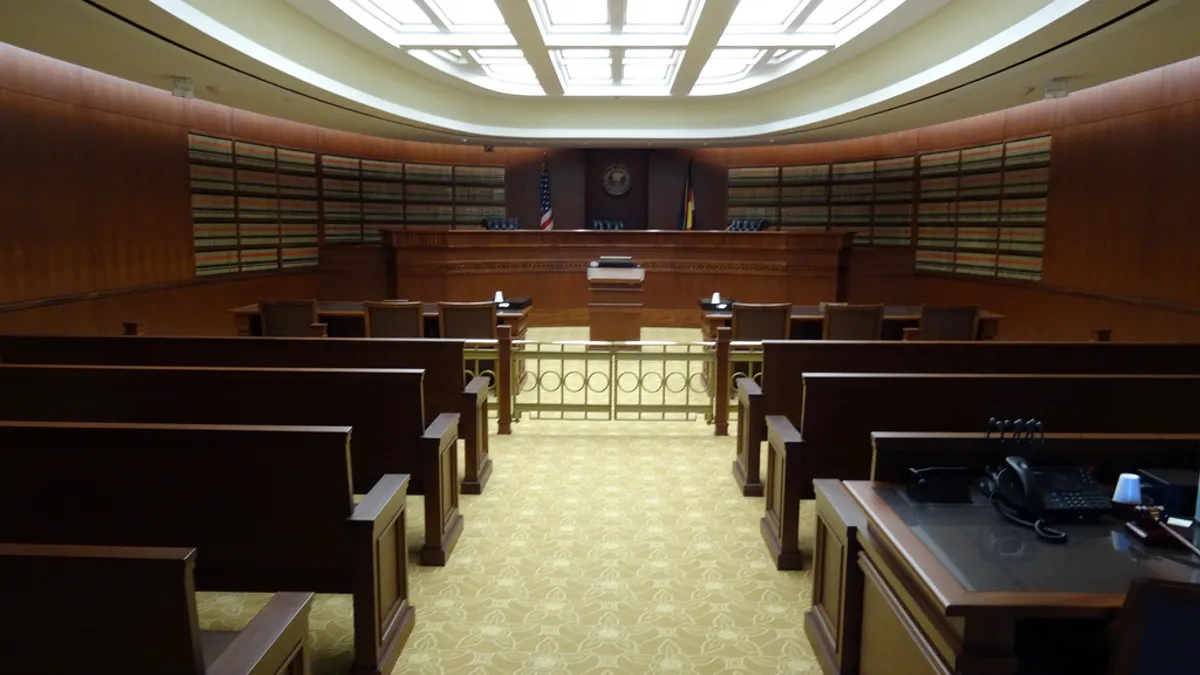Dive Brief:
- Electric utilities have a legal obligation to plan for climate change and its impacts under public utility and state tort laws, and could face liability if they fail to do so, according to a new report from the Environmental Defense Fund and the Sabin Center for Climate Change Law at Columbia Law School.
- Electric utilities "should be reorienting risk assessment and management efforts" to address "increasingly knowable climate change impacts," according to Michael Panfil, EDF's director of federal energy policy and an author of the report.
- The use of tort law, which covers harm related to civil claims, could provide "another legal mechanism for reforming local electricity distribution," according to Ari Peskoe, director of Harvard University's Electricity Law Initiative. But he said "the best approach" remains using the utility regulatory commissions to ensure utilities are prepared for climate change.
Dive Insight:
Panfil acknowledges that the report's conclusion is "novel," but also says "the novelty is one that doesn't depart from core legal obligations and longstanding understandings of our legal system."
"To the extent there are obligations and requirements that entities avoid harm [and] reasonably consider risk, climate change should be no different," Panfil said.
Public utility law "obligates electric utilities to meet, among other things, prudent investment, safe and adequate service, and reliability standards," and tort law requires electric utilities to "avoid foreseeable harm when performing acts that could injure others, EDF's report says. A. The group concluded that now includes climate change, as the consequences "become ever-more pronounced and pervasive."
Addressing that risk will require utilities to utilize a two-stage planning process, said Panfil, including completing a climate vulnerability assessment, and then developing a climate resilience plan to reduce the risk to vulnerable assets.
But is it true that utilities are legally required to plan for climate change? Experts say this isn't clear.
"The devil is in the details," said Jonathan Adler, director of the Coleman P. Burke Center for Environmental Law at Case Western Reserve University School of Law. According to Adler, the answer is "maybe."
"I think the real question is what sorts of specific harms are alleged to be reasonably foreseeable consequences of the utilities' conduct (and which conduct we're talking about)," Adler said in an email. "I think this is more difficult in the climate context than some others, though the increase in climate-related litigation means this is something utilities should pay attention to, even if I'm not convinced their obligations are as great as EDF might suggest."
The Edison Electric Institute, which represents investor owned utilities, did not weigh in on EDF's conclusions.
According to Karl Rábago, an energy sector consultant and former Texas utilities commissioner, while it is unclear if utilities have legal obligations under tort law to plan for climate change, just the threat of legal action could force adjustments to planning processes and regulatory thinking. If a utility is forced to pay damages or settle out of court for climate-related harm, utility commissions will take note, he said.
"Public utility commissions are not immune to public sentiment," Rábago said. Regulators will be asking if the issue is within their jurisdiction, "and the growing evidence of harm, which itself increases the risk of liability, makes it more likely it is."
But ratemaking and planning processes remain the most effective way to reform how utilities do business, according to Peskoe.
"Reform advocates can participate in those processes, but ultimately PUCs make the decisions," he said in an email. "Tort law provides another avenue for advocates, although it’s more reactive."
Peskoe said claims made under tort law can be "another tool in the toolbox for advocates to pursue reforms."
"I suppose the goal of these tort cases would be to make utilities’ past practices so expensive ... that they are essentially compelled to reform their operations or planning in response," Peskoe said.
Rábago, who as a new commissioner in 1993 asked utilities about their plans to approach carbon regulation, said addressing climate change will require utilities to account for the risks and impacts.
"We still have not yet confronted this on a state by state regulatory basis," said Rábago. "And we are still mostly having conversations about how we're going to regulate carbon out of existence, as opposed to internalizing the risk and deciding that the public interest requires a mitigation of that risk."
Panfil says the key in all of this, is that the impacts of climate change are now well-understood. "What we're trying to do is take longstanding law and marry it to increasingly foreseeable climate risks," he said.
Editor's note: This story has been updated to indicate that the Sabin Center for Climate Change Law at Columbia Law School developed the report along with the Environmental Defense Fund.















